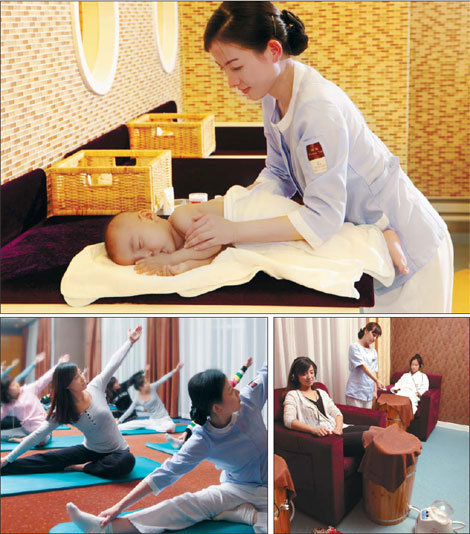Born with a silver spoon
 |
|
Clockwise from top: A caregiver at a postnatal center gives an infant an after-bath massage. New mothers enjoy traditional Chinese medicine therapy. Yoga classes help women regain their figures after delivery. Provided to China Daily |
Postnatal centers that take care of mother and child are becoming increasingly popular among China's rich new parents. Liu Zhihua reports.
Qiang Zhe, a Shanghai Airlines flight attendant, is tweeting on the bed of her hotel-style standard room, looking radiant and rested, after giving birth two weeks ago. "I'm taken good care of and I'm enjoying my time," says the 27-year-old, who paid about 40,000 yuan ($6,350) to be cared for at the postnatal center (zuoyuezi) for 30 days after giving birth.
Zuoyuezi, which literally means "to sit the month", is a tradition said to date back to the Western Han Dynasty (206 BC-AD 24) and is still widely followed.
New mothers are asked to stay indoors for the first month after delivery to stay warm, get adequate nutrition and rest.
Traditionally, taking care of new mothers and their babies is the responsibility of other family members, usually the mother or mother-in-law.
However, since the start of the millennium, hiring a yuesao (a stay-at-home care giver during the postpartum period) has become a common solution for families willing to pay. Postnatal centers, for the rich at least, are the latest trend.
Qiang's husband, surnamed Dai, heard about postnatal centers from a friend and thought it sounded good.
"We have no experience, and our parents' experience of postnatal confinement is outdated," Dai says."Besides, we don't want to burden them."
They chose a center near their home when Qiang was six months pregnant. Since arriving from hospital, she has seldom left.
"I don't feel bored at all," Qiang says, adding her husband visits after work.
Her room has all the conveniences of a fancy hotel and has two beds. The temperature is set at 25 C, and she can shower whenever she likes.
She eats well, too, enjoying a diet of appetizing food specially designed for new mothers by nutritionists.
Pediatric nurses look after her son, along with other babies in the bay unit, so she can rest whenever she likes.
Programs to improve the infant's IQ and physical development, such as swimming and early education, are also scheduled.
During the day, Qiang breastfeeds the infant herself. At night, nurses feed the child when it wakes up.
"I enjoy uninterrupted rest, and when I miss the baby, I phone to ask the nurses to bring him to my room at any time," Qiang says.
Doctors and nurses also provide training and advice to new mothers like her.
Qiang has a television set in the room but seldom uses it, because she wants to rest her eyes. Other centers have TV channels that provide 24-hour monitoring of the child.
Mothers can enjoy massages and physiotherapy and do tailored exercises under guidance.
"We have an average of four employees for every mother and child," says Shen Guozhen, vice-president of the Shanghai-based UIB Maternity Care Center.
The center operates in a villa surrounded by manicured gardens in the Lujiazui area of Shanghai and looks over the Huangpu River. It has 60 suites and charges from 60,000 yuan ($9,526) to 1.2 million yuan monthly.
The most expensive care plan includes an exclusive care team and a suite of 406 square meters, which provides rooms for visitors and has heightened security measures.
The center claims it is the vanguard of the market. It has had celebrity customers, such as actor Lu Yi and anchorwoman Zeng Zimo.
Luo Shuhan, the center's brand director, says their management team is a pioneer in the maternity care industry, as they were the first to get approval from the Shanghai government to establish a postnatal center in 2007.
At that time, there were just three postnatal centers in Shanghai and only one in Beijing, Luo says. Now Shanghai has more than 30 centers, and Beijing has about seven.
"The craze has swept across China and even crept into some small cities," Luo says.
Xu Bin, a graduate from Tongji University, came up with the idea of opening a postnatal center when she was preparing for pregnancy.
She created the first branch of Yuezi Xixi Postnatal Center in mid-2007 in Shanghai's Pudong district.
The company now has six branches in Shanghai, Shenzhen, Hong Kong and Ningbo of Zhejiang province, and is able to provide services for up to 150 families. The prices range from 30,000-100,000 yuan for one month's care.
"Zuoyuezi has a long history in China, and new mothers are the focus of the whole family. People are willing to spend money to take good care of them," Xu says.
Tao Lin, a senior manager at an IT company in Beijing, paid 40,000 yuan in mid-2010 for a 30-day postnatal center service. She says it was one of her wisest decisions.
Previously, the family had considered hiring a care giver and her mother even took training classes.
But the mother found nearly all those being trained were middle-aged women who had poor educational backgrounds and they were only concerned with making money.
"Zuoyuezi is very important, and I didn't think I could find a satisfying care giver," Tao says. "Even if I found one, what if she left abruptly?"
Tao says she visited three postnatal centers before making the decision. The center she chose was small, with just seven suites.
She didn't have to do anything but take herself and her child to the center, as everything else was dealt with by the center.
"I didn't want to burden my family or be burdened," Tao says. "The money I paid was worth the service."
















